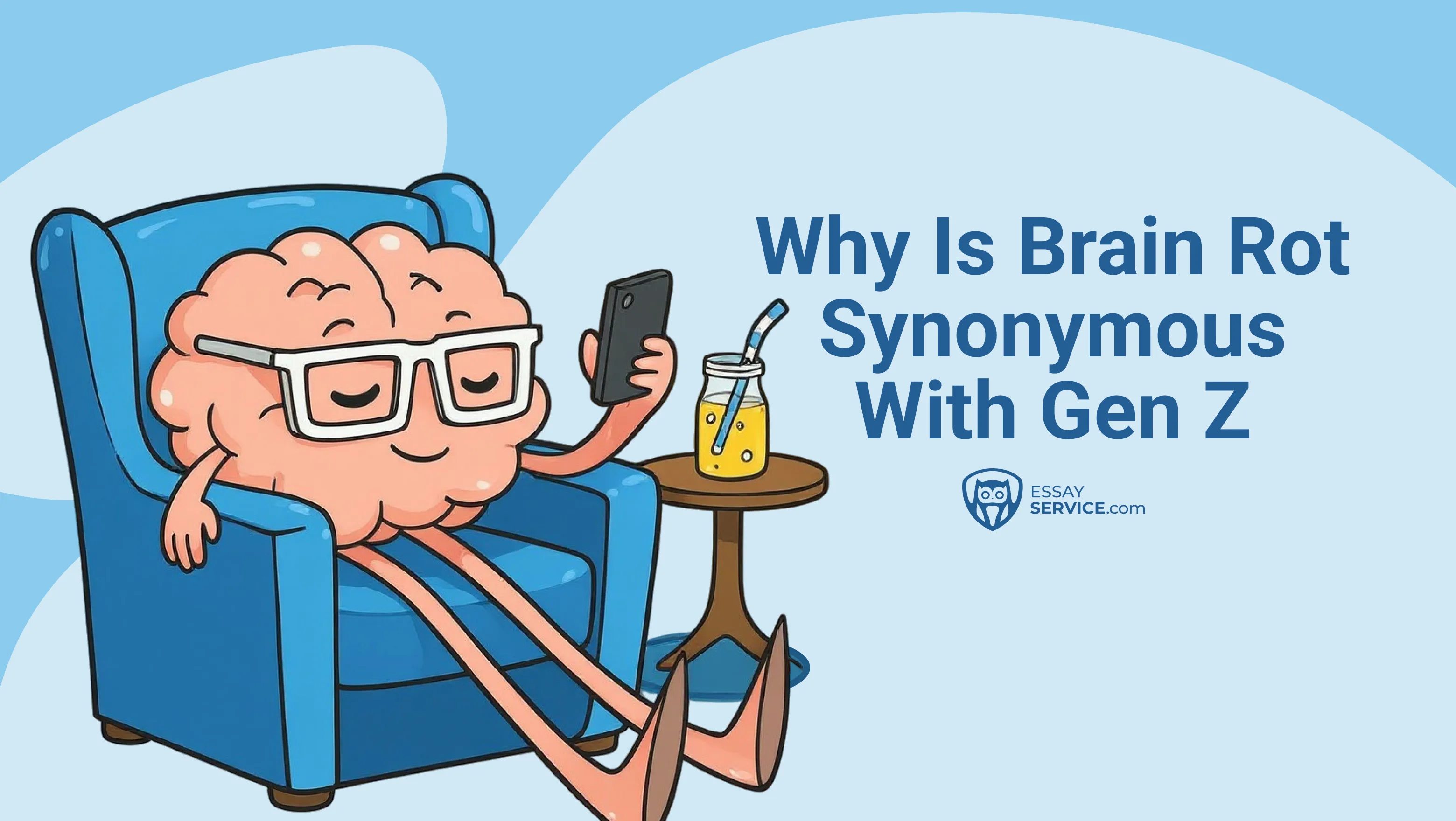Key Takeaways:
- Brain rot rose from slang to Oxford’s Word of the Year, signaling digital-age anxiety.
- It describes mental fatigue from endless online content, often tied to Gen Z.
- Gen Z counters the label, showing strong digital skills and purposeful tech use.
- Students can avoid mental strain by managing screen time and using tools wisely.
Once a fringe slang tossed around in gaming chats, Brain Rot has now entered the Oxford English Dictionary as a word of the year in 2024, following a public vote in which more than 37,000 people had their say.
This article explains why that happened, how the phrase reshaped conversations about technology, and what it reveals about our digital minds. We will summarize a brain rot study, the symptoms of this phenomenon, stigma, and significance for students navigating an online-heavy world.
For those crafting essays on topics like this, EssayService offers research-backed writing support and guidance, helping students translate complex phenomena into powerful arguments.

Brain Rot as an Oxford Word
The Oxford word “brain rot” is defined in Oxford English Dictionary (OED) as:
‘A perceived loss of intelligence or critical thinking skills, especially attributed to the overconsumption of unchallenging or inane content. Now also: content or material that is perceived to cause this effect.’
This followed its selection as Oxford Word of the Year for 2024, when 'brain rot' saw a dramatic 230 % surge in usage, capturing how people view the mental toll of mindless scrolling on low‑quality social media feeds.
The term itself traces back to Henry David Thoreau’s 1854 essay in Walden, where he condemned society’s rush to 'cure' brain‑rot rather than engage with complexity. Since then, 'brain rot' shifted from literary metaphor into meme‑loving vernacular, its rise fueled by Gen Z’s TikTok‑driven slang culture. With entries like 'skibidi,' 'rizz,' and 'gyatt' swirling around it, 'brain rot' became a linguistic signal: funny, self‑aware, and alarmist, all at once.
In everyday conversation, 'brain rot' functions as a catch‑all for feelings of cognitive fog, short attention spans, and mental fatigue caused by banal online media. The Oxford definition reflects that it is centred on perception, not pathology. Clinical studies, however, consistently reject the notion that consuming memes causes actual encephalopathy or permanent cognitive damage. As neuroscientist Andrew Przybylski explains, 'this moral panic is unfounded', showing discomfort with technology is often rooted in anxiety, not empirical harm.

Brain Rot Symptoms and Gen Z Behaviors
Within Gen Z spaces, 'brain rot' has become a shorthand for a unique form of mental exhaustion tied to online culture. It does not appear in medical manuals, yet it perfectly names what students and young users often feel after long periods online.
Perceived brain rot symptoms include:
- Mental fatigue and fog: Students describe a hazy state where concentrating feels heavy after endless scrolling. Even simple study tasks begin to demand extra energy.
- Weakening attention span: Short-form content encourages fast switching, making longer assignments or readings harder to stay with.
- Memory glitches: Moments of blank recall surface, forgetting facts, or losing the thread of lectures, only to realize later how fragmented attention became.
- Mood dips and restlessness: Quick bursts of humor no longer satisfy, leaving boredom, anxiety, or low drive behind.
Behavioral indicators of brain rot include:
- Prolonged doom-scrolling: Hours pass while users consume trivial content, aware of time slipping but unable to stop.
- Meme-coded speech: Words from trending clips replace regular talk, hinting at how online patterns shape offline expression.
- Content loops: Watching similar absurd videos on repeat, craving the next burst of irony even mid-study.
- Academic disengagement: Checking phones during lectures, skipping essay parts, or feeling drained halfway through assignments.
Gen Z grew up fully online, where the internet blends with daily reality. The term 'brain rot' became their way of laughing at and calling out the effects of constant media exposure. It’s self-aware and sharp, showing they recognize both the humor and the struggle in this habit.
Brain Rot and Gen Z as Synonyms
As soon as Gen Z came of age, they became digital natives, the first ones to experience childhood, adolescence, and higher education entirely online, with no analogue escape. This immense influence of smartphones, social media, and endless feeds has shaped how the generation thinks and communicates.
Older generations often pair brain rot with Gen Z as though the two are interchangeable. When adults hear the term, they tend to picture scrolling teens with dopamine-driven attention spans rather than any research-backed reality. Viral content and rapidly shifting slang have turned brain rot into shorthand for Gen Z screen fatigue, whether it reflects real decline or just culture shock. Interestingly, Gen Z coined and popularized the term themselves, often using it with irony as a badge of belonging.
This reaction follows an old pattern. Skepticism toward youth and new technology has existed for centuries. Parents and critics have expressed fears of generational collapse, from Victorian novels to the rise of video games, demonstrating how moral panic recurs whenever young people master a new medium.
Equating ‘brain rot’ with Gen Z simplifies a more complex story. While older generations use the phrase as a critique, Gen Z often wields it as self-aware humor, signaling both awareness of media overuse and control over how they define their own experience.
Gen Z and Its Rebuttal to Brain Rot
Many older adults frame brain rot as proof that screen time is corroding Gen Z’s minds. But Gen Z often pushes back hard. Angel Galicia Mendoza, a Columbia student writing for Education Week, notes that brain rot is no longer a linguistic quirk, but it’s become a cultural phenomenon.
Gen Z hears the accusation of mental decline and sees it as a blanket dismissal. Many see the label as a judgmental shorthand used by older generations to explain rapidly changing digital habits. Mendoza highlights that the same students who joke about brain rot write coherent essays and deliver persuasive speeches.
This generation didn’t just download apps; they grew up conducting research, debating in chat groups, and switching platforms in seconds. Studies show Gen Z has been shaped by a lifetime of digital tools, such as social media, cloud learning, and personal study systems, giving them a fluency older generations envy. That fluency turns screen time into a kind of digital acumen, rather than academic atrophy.
For Gen Z, screens are instruments. From shaping study routines with apps to remixing educational content into bite-sized slang, the intent is clear: to make digital life work for them. By rejecting brain rot as a one‑sided critique, Gen Z reframes the term. They’re not damaged by digital life. Instead, they’re reshaping what learning, thinking, and socialising mean in a world wired for uncertainty.
Brain Rot as a Mirror for Digital‑Age Anxiety
When Oxford University Press named brain rot its Word of the Year for 2024, it marked how a word surged in usage by nearly 230 percent over twelve months, defined as 'the supposed deterioration of a person’s mental or intellectual state … especially viewed as the result of over‑consumption of … trivial … online content.' That leap in frequency speaks to growing unease that endless documentary shorts and meme loops might be degrading mental stamina, dampening curiosity, and overshadowing reflective learning.
By spotlighting the term’s rapid rise, particularly among Gen Z and Gen Alpha users, media outlets and Oxford’s own analysis hinted at deeper generational friction. Adults worry aloud about cognitive collapse, calling endless feed consumption a drain on memory, sleep, focus, and empathy. And while each new medium from the printing press to the mobile screen has triggered similar anxieties, brain rot gives equal voice to both concern and the younger ones it is aimed at.
Brain rot acts as a linguistic mirror, reflecting a cultural struggle to label the psychological aftermath of life lived online and on demand. It becomes shorthand for mental fatigue, creative atrophy, and emotional numbing, especially when paired with Gen Z slang. Statements like 'That TikTok marathon gave me brain rot’ compress a complex experience into a single phrase. Viral trends such as Skibidi Toilet, rizz, or Sigma memes are the very media labeled brain‑rotting, yet they also produce the language used to critique themselves. In effect, the term embodies both symptom and satire.
When students recognize what brain rot symbolizes, they also gain a tool: a way to examine how digital culture shapes attention, emotional state, and language itself. The term’s popularity uncovers a broader cultural tension between technological allure and academic well‑being, between constant connectivity and mental clarity. As brain rot slips easily into speech, it invites us to name our experience, and in doing so, to reclaim some control over it.
Preventing Brain Rot and Protecting Cognitive Health
Young people, especially Gen Z students, spend much of their day on screens. That doesn’t have to lead to mental exhaustion or so‑called ‘brain rot.’ Research by psychologist Sophie H. Janicke‑Bowles shows that people are adapting in ways that support mental, social, and academic health rather than losing it.
To stay focused in a world built on digital media, try these five simple steps:
- Self‑regulate: Identify which notifications distract you most, such as social media badges, email alerts, or news updates. Use screen‑time trackers, mute unnecessary apps, or schedule tech‑free study periods.
- Curate content for purpose: Choose inspiring online spaces, like study forums, career channels, creative communities. If scrolling drains you, follow educational creators or goal‑focused groups.
- Shift social norms: Challenge default tech habits. Try no‑phone meals, turn devices off during classes or study sessions, and stop replying to every message immediately.
- Repurpose tech: Use apps and platforms to learn something new. Join digital study groups, take creative workshops, or use chat tools as accountability partners.
- Blend offline & online life: Combine digital routines with offline habits. Track your progress, meditate with mindfulness tools, exercise after study sessions, and take natural breaks.
The Bottom Line
The rise of brain rot as both slang and the Oxford Word of the Year reflects society's grappling with the cognitive effects of constant digital stimulation. The centre of this conversation is students. Initially used as an ironic joke, brain rot pushes us to rethink the correlation between technology and cognitive health.
If you’re asked to dig deeper into topics like this one, EssayService can support that process from start to finish with writing and research guidance.
Frequently Asked Questions
What Is the Brain Rot Phenomenon?
It’s a slang term describing mental fatigue and attention issues linked to excessive low-value digital content, especially in online youth culture.
Is Brain Rot an Actual Condition?
No, it’s not medically recognized, but it’s widely used to express concerns about the cognitive impact of heavy screen use.
What Are Signs of Brain Rot?
Signs include mental fog, shorter attention spans, memory gaps, and compulsive scrolling paired with reduced focus on offline tasks.

Phil spends his working days teaching international trade. He contributes to our blog as a freelancer, leveraging his experience with MBA students to advise on academic writing, studying abroad, and securing funds.
- Oxford University Press. (2024, December). Brain rot named Oxford Word of the Year 2024. Retrieved from https://corp.oup.com/news/brain-rot-named-oxford-word-of-the-year-2024/
- Janicke-Bowles, S. H. (2025, June). How we’re adapting to our digital lives and thriving. Psychology Today. Retrieved from https://www.psychologytoday.com/us/blog/positive-media-psychology/202506/how-were-adapting-to-our-digital-lives-and-thriving
- New Yorker. (2024, December). The year in brain rot. The New Yorker. Retrieved from https://www.newyorker.com/culture/2024-in-review/the-year-in-brain-rot
New posts to your inbox
Your submission has been received!



